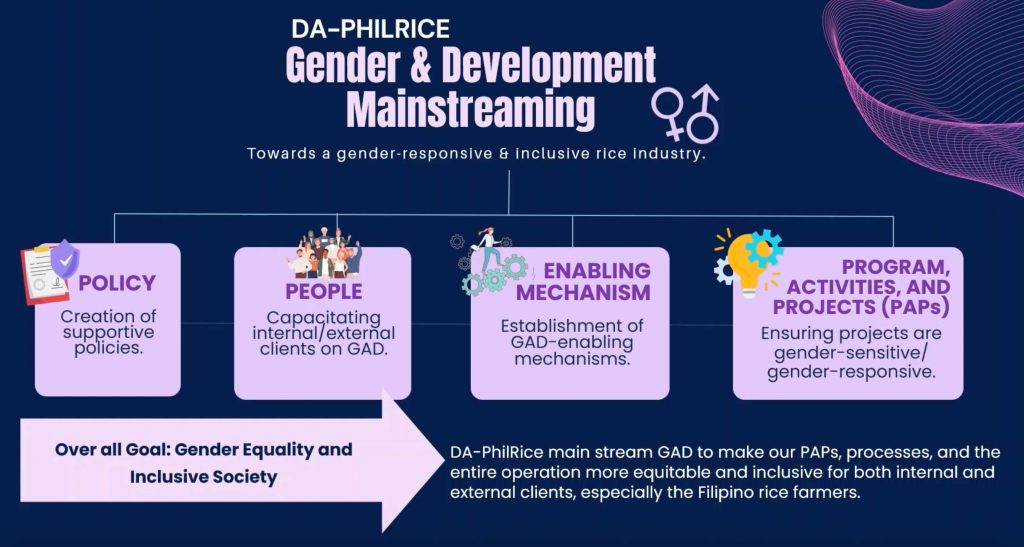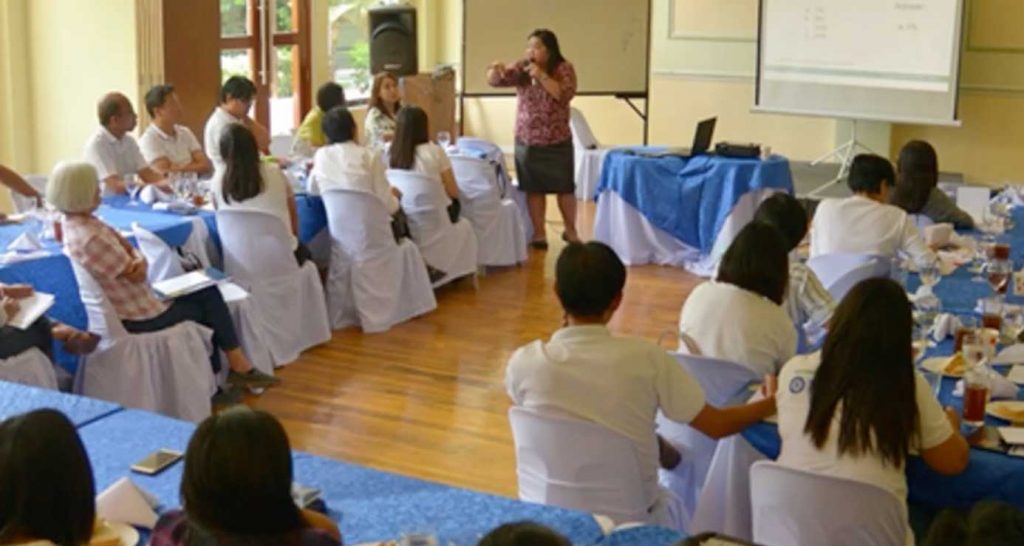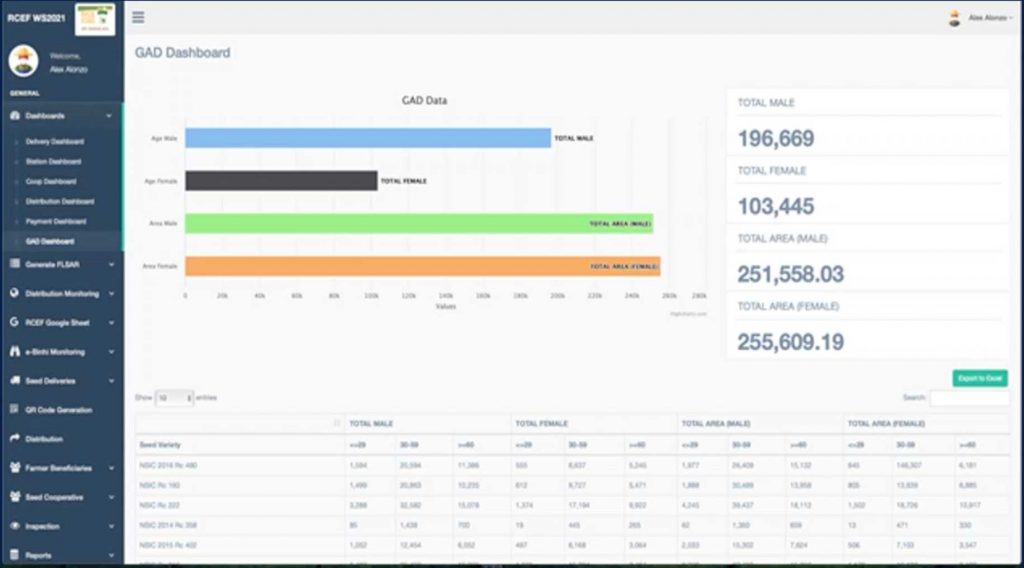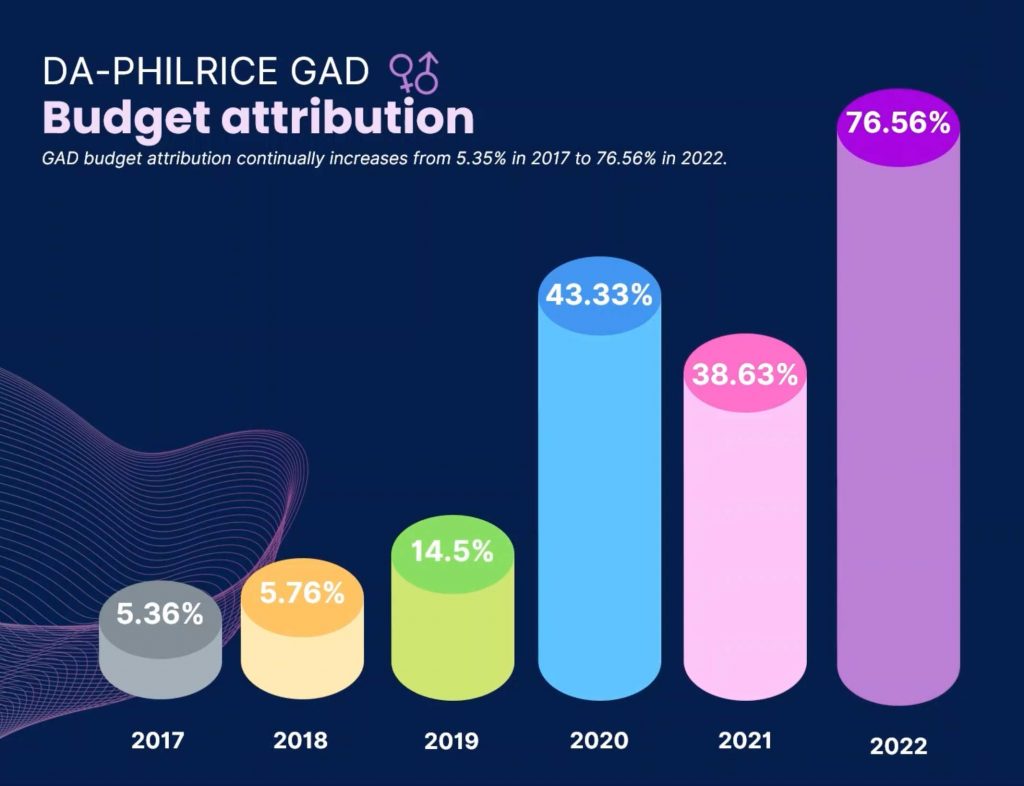Overview
As mandated by Republic Act 9710 or the Magna Carta of Women, the Department of Agriculture – Philippine Rice Research Institute’s (DA-PhilRice) Gender and Development (GAD) Mainstreaming program fosters productivity by utilizing the untapped talent of women by involving them in different roles in farming activities and rice cooperatives, recognizing their significant role in agriculture. By implementing strategic initiatives, aligning with its mission to efficiently utilize public and human resources for increased productivity in the organization, thus contributing to broader goals of good governance and equitable resource utilization, and integrating gender dimensions into policies, programs, and projects.
Challenge
Before GAD implementation, DA-PhilRice faced inefficiencies due to inadequate mechanisms, knowledge, and staff capacity, resulting in significant waste, especially underutilized talent within the organization and the broader agricultural sector. Women, constituting approximately 35% of the 2 million farmers in the Philippines, represent a considerable yet underutilized human resource. The previous situation encompasses limited access to resources, inadequate career and learning opportunities, and insufficient exposure to modern technologies, neglecting the crucial aspects of gender and social dynamics. These inefficiencies hindered women’s full participation in the organization and impeded the overall productivity and effectiveness of DA-PhilRice. The GAD Mainstreaming initiative strategically addresses these challenges, aiming to unlock the potential of women in the workforce, thereby contributing to the optimization of human resources and fostering gender-inclusive organizational and agricultural productivity.
Solution
The PhilRice Gender and Development (GAD) Mainstreaming initiative strategically addresses underutilized talent through several innovative features:
Policy and Management Support: PhilRice secured strong policy and management backing, leading to the issuance of numerous policies supporting GAD institutionalization. This top-down support ensures that gender considerations are integral to the organization’s operation.

Customized Capacity Development: Capacity development materials were tailored to the context of the participants. This customization facilitates better internalization and integration of GAD principles in program implementation. Despite the challenges posed by the COVID-19 pandemic, these materials allowed for the continuity of GAD capacity-building activities.

Gender-Responsive Database Management: PhilRice incorporated sex-disaggregated data into its database management systems, providing a foundation for gender-responsive planning, monitoring, and evaluation. This is innovative in a way that it is integrated in the major programs/projects of the institute to gather sex-disaggregated data and other gender-related indicators of both internal and external clients as basis for analysis in providing more gender-responsive and inclusive services. A case in point is the Rice Competitiveness Enhancement Fund (RCEF) – Seeds Program GAD Database which records real-time data of clients and aids in the conduct of gender analysis, resulting in more inclusive interventions in the program implementation such as the creation of priority lanes for senior citizens, pregnant women, and specially-abled individuals during the seed distributions, and authorized claiming of seeds for individuals with physical limitations.

Project Review and Evaluation Committee: Assesses project proposals to ensure the integration of gender dimensions. This mechanism correlates with a surge in gender-sensitive/responsive projects, augmenting the budget allocation and, consequently, PhilRice’s impactful initiatives catering to the gender-specific needs of rice farmer-beneficiaries. Through these innovations, PhilRice’s GAD Mainstreaming breaks barriers and fosters a sustainable, gender-inclusive paradigm for agricultural development.

These innovative features collectively empower women in agriculture, bridge historical gaps, and enhance productivity by ensuring that programs and projects are tailored to the diverse needs of the community. The approach goes beyond token gestures, aiming for a holistic organizational culture transformation towards gender equality and inclusivity.
Productivity Gains, Outcomes, and Impact
PhilRice’s GAD Mainstreaming initiative has yielded substantial productivity gains and transformative outcomes by strengthening its institutional capability (Outcome 7 of the 2017-2022 PhilRice Strategic Plan). As of 2022, 100% of 225 permanent staff and 44% of 1583 contract service staff were trained on GAD. This resulted in better implementation of gender-sensitive and responsive projects reflected in increasing GAD budget attribution over the years (5.36% in 2017, 5.76% in 2018; 14.5% in 2019, 43.33% in 2020, 38.63% in 2021, and 76.56% in 2022). This budget attribution is far higher than the minimum 5% GAD budget requirement as mandated by law. Due to this performance, the institute received COA commendations for 2 consecutive years. Moreover, based on the 2023 GAD audit by the Philippine Commission on Women, GAD mainstreaming at the institute is marked at level 4 (meaning GAD is already institutionalized in the institute with ongoing sustainability efforts). In the same year, PhilRice GAD mainstreaming was also named International Best Practice (6-star outstanding) in the International Best Practice Competition.
The gender mainstreaming efforts have also empowered women farmers, propelling them into leadership roles within their associations. This recognizes their potential and their substantial contributions to enhancing farm efficiency and overall productivity. Through these concrete outcomes, PhilRice’s GAD Mainstreaming exemplifies its commitment to inclusive and impactful agricultural development.
The impact is striking as women’s active involvement in the program’s capacity-building activities correlates with a 12% increase in yield and a 6 to 8% reduction in the cost per kilogram of rice production among women farmers. This enhances the economic viability of their farming activities and contributes to broader economic goals.
Moreover, approximately 50% of women participants diversified into other enterprises, serving as an additional income source and generating a combined net income of $12.3 thousand. As integrated into various programs, GAD mainstreaming ensures that women’s pivotal roles in food production are acknowledged. Equal access to food production resources is guaranteed, fostering a more equitable agricultural landscape. This commitment to equitable access to resources resonates with OIC Deputy Executive Director for Research, Dr. Eduardo Jimmy P. Quilang, as he accentuates a profound shift in engineering consciousness toward inclusivity.
The Rice Competitiveness Enhancement Program (RCEP) under GAD ensures that all eligible women and men farmers, including those in vulnerable sectors, receive free, high-quality certified seeds of inbred rice varieties. The distribution of around 10.29 million bags of certified seeds during the 2020 to 2022 seasons has benefited more than 1 million farmers, cultivating approximately 1.5 million hectares annually across targeted provinces. This substantial support contributed to achieving record-high palay production in the country for two consecutive years.
In summary, PhilRice’s GAD Mainstreaming has translated into concrete productivity gains, from increased project attribution to tangible improvements in the lives of women farmers. Integrating gender considerations is not just a checkbox but a catalyst for meaningful change, fostering a more inclusive and productive agricultural landscape.
Lessons Learned/Challenges in Implementing the Intervention
PhilRice’s GAD Mainstreaming initiative, while successful, has encountered challenges and offers valuable lessons for ongoing improvement. One major challenge is the initial absence of adequate mechanisms, knowledge, and staff capacity, hindering seamless GAD integration. This highlights the importance of continuous training and education to build the skills necessary for effective gender mainstreaming. Human Resource Management Office Head, Ma. Ethel P. Gibe emphasized the importance of Gender Sensitivity and Analysis Training to all PhilRice staff.
The impact of the COVID-19 pandemic on physical interactions posed another hurdle. The innovative adaptation of asynchronous training methods and the creation of localized GAD focal point systems helped overcome this challenge. However, the lessons underscore the need for flexible strategies to ensure uninterrupted GAD capacity-building activities during unforeseen circumstances. Jungie A. Diamsay, Science Research Specialist II, reflects on the challenges of implementing customized GAD training.
The process of mainstreaming GAD also revealed the critical role of supportive policies and management. The issuance of policies, such as integrating gender dimensions into projects, significantly shaped the ‘human face’ of rice science. A key lesson is the importance of institutional commitment and policy support for sustaining GAD efforts, as mentioned by Supervising Science Research Specialist Dr. Diadem B. Gonzales-Esmero during a key informant interview.
Additionally, the emphasis on sex-disaggregated data in database management highlights a lesson in the importance of comprehensive and gender-sensitive information systems. Moving forward, continuous improvement in data collection and analysis methods can provide more nuanced insights into the impact of projects on different genders.
Regarding potential areas for improvement, PhilRice could focus on further decentralizing GAD initiatives, ensuring that the benefits are evenly distributed across all stations and satellite offices. Strengthening partnerships with external organizations, including international bodies, can enhance the sharing of best practices and promote a broader impact. Continuous monitoring and evaluation of GAD efforts can identify areas that require adjustment and fine-tuning, ensuring a dynamic and responsive gender mainstreaming strategy. Overall, the journey of PhilRice in GAD mainstreaming provides a rich tapestry of lessons that can guide future initiatives towards even greater effectiveness and inclusivity.
Resources
Gonzales-Esmero, D. B. (2021). Gender Mainstreaming in Philippine Rice Research and Development: Progress, Challenges and Opportunities. Rice-Based Biosystems Journal, 9, 75–86.
Carrera, G. D. (2023, May). Women commission recognizes phirice’s gad mainstreaming activities. Rice Matters, p. 1.
